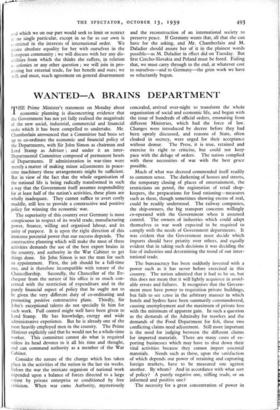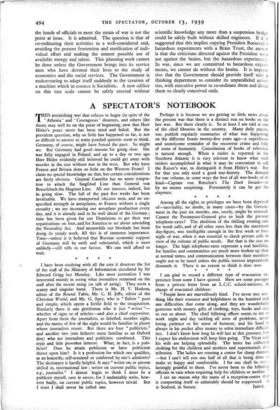WANTED - A BRAINS DEPARTMENT T HE Prime Minister's statement on Monday
about economic planning is disconcerting evidence that the Government has not yet fully realised the magnitude of the new social, industrial, commercial and financial tasks which it has been compelled to undertake. Mr. Chamberlain announced that a Committee had been set up to co-ordinate the economic and financial policy of the Departments, with Sir John Simon as chairman and Lord Stamp as Adviser ; and under it an inter- Departmental Committee composed of permanent heads of Departments. If administration in war-time were merely a matter of making minor adjustments in peace- time machinery these arrangements might be sufficient. But in view of the fact that the whole organisation of the national life is being radically transformed in such a way that the Government itself assumes responsibility for at least half of the nation's activities, these plans are wholly inadequate. They cannot suffice to avert costly muddle, still less to provide a constructive and positive policy for winning the economic war.
The superiority of this country over Germany is most conspicuous in respect of its world trade, manufacturing power, finance, willing and organised labour, and its unity of purpose. It is upon the right direction of this immense potential power that our success depends. The constructive planning which will make the most of these activities demands the use of the best expert brains in the country, and authority in the War Cabinet to get things done. Sir John Simon is not the man for such an appointment. First, the job should be a full-time one, and is therefore incompatible with tenure of the Chancellorship. Secondly, the Chancellor of the Ex- chequer from the nature of his office is so much con- cerned with the restriction of expenditure and in the purely financial aspect of policy that he ought not to be given the very different duty of co-ordinating and promoting positive constructive plans. Thirdly, Sir John's exceptional talents do not specially fit him for such work. Full control might well have been given to Lord Stamp. He has knowledge, energy and wide administrative experience. But he is already one of the most heavily employed men in the country. The Prime Minister explicitly said that he would not be a whole-time worker. This committee cannot do what is required unless its head devotes to it all his time and thought, and can command authority as a member of the War Cabinet.
Consider the nature of the change which has taken place in the activities of the nation in the last six weeks. Before the war the intricate organism of national work depended upon a balance of forces directed to a large extent by private enterprise or conditioned by free criticism. When war came Authority, mysteriously concealed, arrived over-night to transform the whole organisation of social and economic life, and began with the issue of hundreds of official orders, emanating from different Ministries, which had the force of law. Changes were introduced by decree before they had been openly discussed, and reasons of State, often cloaked in secrecy, were urged for their acceptance without demur. The Press, it is true, retained and exercise its right to criticise, but could not keep pace with the deluge of orders. The nation complied with these necessities of war with the best grace possible.
Much of what was decreed commended itself readily to common sense. The darkening of houses and streets, the temporary closing of places of entertainment, the restrictions on petrol, the registration of retail shop- keepers, the preparations for food rationing—measures such as these, though sometimes showing excess of zeal, could be readily understood. The railway companies, the ship-owners, the big transport concerns willingly co-operated with the Government when it assumed control. The owners of industries which could adapt themselves to war work expected to be required to comply with the needs of Government departments. It was evident that the Government must decide which imports should have priority over others, and equally evident that in taking such decisions it was deciding the fate of industries and determining the trend of our inter- national trade.
The bureaucracy has been suddenly invested with a power such as it has never before exercised in this country. The nation admitted that it had to be so, but this does not mean that it will lightly acquiesce in avoid- able errors and failures. It recognises that the Govern- ment must have power to requisition private buildings, but fails to see sense in the arbitrary manner in which hotels and hydros have been summarily commandeered, causing unemployment and the maximum of private loss with the minimum of apparent gain. In such a question as the demands of the Admiralty for trawlers and the demands of the Food Department for fish, these two conflicting claims need adjustment. Still more important is the need for judging between the different claims for imported materials. There are many cases of ex- porting businesses which may have to shut down their vital activities because they cannot import essential materials. Needs such as these, upon the satisfaction of which depends our power of retaining and capturing foreign markets, have to be measured one against another. By whom? And in accordance with what sort of policy? A purely negative one, stifling trade, or an informed and positive one?
The necessity for a great concentration of power in the hands of officials to meet the strain of war is not the point at issue. It is admitted. The question is that of co-ordinating their activities to a well-considered end, avoiding the present frustration and sterilisation of indi- vidual effort and making the utmost possible use of available energy and talent. This planning work cannot be done unless the Government brings into its service men who have devoted their lives to the study of economics and the social services. The Government is endeavouring to adapt itself suddenly to the creation of a machine which in essence is Socialistic. A new edifice on this vast scale cannot be safely erected without scientific knowledge any more than a suspension bridge could be safely built without skilled engineers. If it is suggested that this implies copying President Roosevelt's hazardous experiments with a Brain Trust, the answer is that the criticisms directed against the President were not against the brains, but the hazardous experimenis. In war, since we are committed to hazardous experi- ments, we cannot do without the brains. It is impera- tive that the Government should provide itself with a thinking department to consider its unparalleled activi- ties, with executive power to co-ordinate them and direct them to clearly conceived ends.











































 Previous page
Previous page